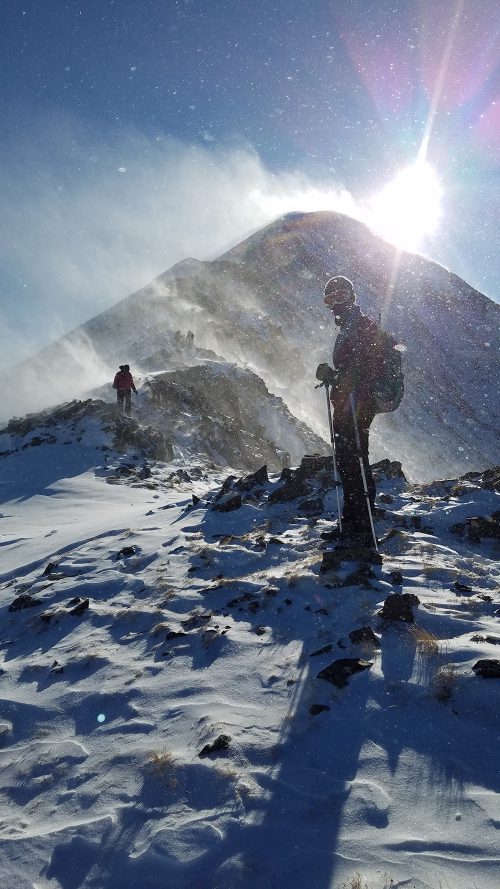This is the first in a multi-part series exploring how Valley residents actually spend the winter months, managing cold, wind, snow, and ice while going about the daily activities that provide our livelihood and sense of community. Here, we look into the possible behavioral repercussions of living through long winters in Custer County.
What else are you missing? Get the whole Tribune Instantly!
https://ee.wetmountaintribune.com/site/forms/subscription_services/
–By W.A. Ewing
Perhaps no other season draws more local comment than winter. Of course spring draws attention to run-off and moisture; summer, to warmth, grazing, growing, and hopefully more moisture; fall, to brilliant color and crisp, glowing days. But winter? While snow is always welcome for the water equivalency it will bring to the Valley floor, after the round of November through early January holidays, residents kind of hunker down for the annual siege of unrelenting cold, long nights, and short days.
The vast majority of the year-round population soldiers on through, knowing that spring, even with late snowstorms, is right around the corner, somewhere, with its fresher days, and increasing light. Others might find however, that their attitudes and behaviors sort of dim down, just like the light.
It is the latter reality which is the crux of increased grumpiness, declining energy, restless sleep, and what we generally refer to as “the winter blahs.”
The behavioral health description of behaviors and attitude which might change in such significant proportions as to affect quality of life has been known since the mid-1980s as “Seasonal Affective Disorder,” or SAD. First met with skepticism and disbelief in the field of psychiatry, the diagnosis has come to be accepted, not as a specific disorder, but as a “course specifier,” attached to major depressive episodes and other demanding behavioral disorders.
Be that as it may in the general American populace—as might be expected, Florida has the lowest rate of clinically reported SAD, Alaska the highest—Custer County, according to counselor/therapist Desiree Lipka, director of the Westcliffe Solvista office, is bereft of clinical SAD diagnoses. Lipka, noting that “there is no uptick” of the SAD diagnosis here, says that “SAD is a light issue; it’s not the cold or shorter days, actually, but the lack of sunshine, and SAD is more prevalent where there are drearier days. Here we have so many days of sunshine—but here’s the thing: one must go into the sunshine! Otherwise, there’s no advantage to what we experience here.”
Cold and wind may get in our way of that simple opening the door and stepping into a winter sun struck day, but doing so lessens the prospect of feeling the winter doldrums.
One widely held belief that Lipka took time to dispel is that suicide rates rise in the winter, given the propensity to feel kind of down during these months. Not so, she points out; “It’s April, when despondent people see others around them enjoying the turn of time and season, and think they should feel better, but don’t.”
The good news for any Valley resident who might be experiencing an excess drain of energy, downward mood swing, increased agitation, or social withdrawal is that help is readily at hand. “Don’t hesitate to call,” Lipka says, whatever the concern or question. For example, some folks who do experience depressive or anxiety episodes, or addictive issues might look to alcohol as a way to cope with the long dark of winter. And of course alcohol is a depressant, furthering a downward spiral. The seven staff members at Solvista now include four clinicians, including a child and adolescent specialist; programs include intense substance abuse treatment, both individual and group therapy options, a mobile crisis person who comes to the home, and case and care management. The local Solvista Health office, on the northwest corner of 6th and Main, Westcliffe can be reached 24/7 at 719-783-0566.
Whether one is poised for winter light related feelings of discontent or not, one thing available for everyone’s behavioral healthcare toolkit is Solvista’s “Mental Health First Aid” workshops; watch for the announcement of the next gathering to be locally convened.
For those who tromp on through the season, perhaps complaining of personally unsettling feelings, perhaps not, there are varied and healthy winter doings that uplift one’s being. This series will explore the ways in which outdoor activity, the work of ranching, maintaining small businesses during these months, being a student, and the exercise of particular habits and disciplines bring us through winter to the inevitable, and welcome spring.
– W.A. Ewing

